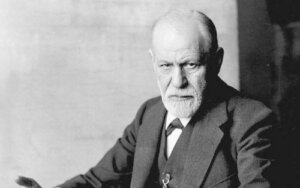5 Ideas of Sigmund Freud about Sex

There are many ideas that come from the father of psychoanalysis that continue to be employed today. Love and sexuality were recurring themes in the philosophy of this well-known psychoanalyst. Therefore, in today’s article, we’d like to tell you little about the ideas of Sigmund Freud surrounding sex and sexuality.
From time to time new controversies related to Sigmund Freud’s ideas arise. The interpretation of dreams, the Oedipus complex, the superego and the unconscious are some of his most studied theories even today.
Freud is known worldwide for having studied different psychological disorders through dialogue with his patients. Both in his time and today, he’s managed to leave quite a controversial mark on society... especially with regard to his ideas on sex.
Sigmund Freud’s various theories about sex are very controversial and of course have been discredited, on several occasions, by many philosophers, doctors and religious people.
Sigmund Freud’s idea about sex
To begin with, it should be noted that, in psychoanalysis, sexuality is not the same as genitality. The former is a very broad concept, which encompasses different ways of relating to others, including of course the genitals, i.e. penetration or intercourse.
That said, here are some of Freud’s other ideas about sex.
1. Pleasure

We usually relate pleasure to sex. However, it also appears in other stages and situations of life. According to Freud, children struggle to satisfy their needs and avoid “displeasure,” which is the opposite of enjoyment.
Pleasure, then, is the force that guides us to identify ourselves as people and fulfills our basic survival needs. Our unconscious is where the pleasurable appears (or the search for something that offers it to us), while reality operates at the level of consciousness.
According to Sigmund Freud, something that’s real is the opposite of pleasure because it makes us realize that we live with other people and that we can’t always fulfill our desires. This is how, as we grow up, we come to repress the urge to do only what’s pleasurable for ourselves.
You might like to read: The Importance of Foreplay or Games Before Sex
2. The libido according to Sigmund Freud

Related to the previous concept, we can talk about another taboo topic of Sigmund Freud surrounding sex. According to him, sexual impulses begin in childhood and then increase in adulthood and are channeled through energy called libido.
This manifests itself on an object or an individual with a single intention: sexual activity. However, not all libido “goes” to the same recipient. It can also appear in family and social bonds for the purpose of survival.
3. The stages of sexuality
For Freud, sex begins at birth and manifests itself in different ways. He separated the drives into two different types: sexual and self-preservation. The latter are present in childhood and the former in adulthood.
Also, the “father of psychoanalysis” has indicated that there are different stages of sexuality, almost all of which are experienced when we’re little and then maintained as we mature.
The first is the oral stage, in which the object of satisfaction is the mouth. The second is the anal stage (sphincter control), the third is the phallic or clitoral stage (in boys through the penis and in girls through the clitoris).
Then, the fourth is the latent sexual stage (when we dedicate ourselves to intellectual activities and leave aside sexual exploration) and the last one is the genital stage, which coincides with the entrance to puberty and in which sexuality is again explored through coitus.
You might find this interesting: The Differences Between Bisexuality and Pansexuality
4. The Oedipus Complex
Another of Sigmund Freud’s ideas about sex that has generated the most controversy is the relationship between mother and child. According to an ancient myth, Oedipus was a man who went so far as to kill his own father because he fell in love with his mother. Therefore, this complex takes its name from this tragic character.
According to Sigmund Freud, “sexual desires towards the mother are more intense than affection towards the father, who is perceived as an obstacle.” The Oedipus complex states that a male child wants to “seduce” his mother and that this undoubtedly leads to conflict with his father.
It begins during the phallic stage as a response to “maternal seduction,” after the child has become acquainted with his body and its pleasurable areas. At that time, he denies the presence of the father, considering him a threat to the mother-child union. The Oedipus complex usually reduces its intensity in the latent stage and disappears during the genital phase.
Although Freud has only spoken of cases between boys and their mothers, the theory was later developed with girls and fathers. This is known as “the Electra complex” and is the female equivalent of this complex.
5. Eroticism according to Sigmund Freud

Finally, we can’t leave aside one of Sigmund Freud’s key concepts about sex, which is also related to the theory of the Ego, the Id, and the Superego. With this idea, Freud tried to explain human psychic functioning. The Ego is the unconscious, the superego is the moral force, and the Superego is the one that mediates between the two.
So what do these three have to do with eroticism?
Well, according to the psychoanalyst, everything. Eroticism is the balance between the aesthetic and the moral in which the unchanneled impulses of desire intervene and are repressed on the basis of the rules and conditioning of society. Therefore, this could be considered the analog of the self.
Freud was and remains to be a controversial character. However, this doesn’t mean that he was a bad figure. On the contrary, he serves as a point of reference to reflect and build a critical attitude.
All cited sources were thoroughly reviewed by our team to ensure their quality, reliability, currency, and validity. The bibliography of this article was considered reliable and of academic or scientific accuracy.
- Alós, D. (2017). 10 diferencias entre Freud y Jung. La mente es maravillosa. [En línea] Disponible en: https://lamenteesmaravillosa.com/10-diferencias-entre-freud-y-jung/
- Alós, D. (2017). El complejo de Edipo. La mente es maravillosa. [En línea] Disponible en: https://lamenteesmaravillosa.com/el-complejo-de-edipo/
- Freud, S. (1905d). Tres ensayos de teoría sexual. [En línea] Disponible en: http://www.cieg.unam.mx/lecturas_formacion/identidad_imaginaria/Tema_III/Sigmound_Freud_Tres_Ensayos_sobre_la_sexualidad.pdf
This text is provided for informational purposes only and does not replace consultation with a professional. If in doubt, consult your specialist.








